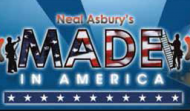
Host Neal Asbury opened his nationally syndicated “Neal Asbury’s Made in America” show on Radio America (now on 48 stations) by recounting a government assessment that electricity prices will rise under the Obama administration’s energy policies that promote higher costs connected with under-performing renewable energy options at the expense of reliable and cheaper forms of energy, such as coal.
Joining Made in America, as a guest, was Chris Warren from the American Energy Alliance, a not-for-profit organization that engages in grassroots public policy advocacy and debate concerning energy and environmental policies.
Warren cited a new survey that found that most American voters have serious reservations about the federal government’s involvement in their energy choices—specifically with regard to policies like the wind Production Tax Credit (PTC) and the EPA’s proposed power plant rule.
“The Obama administration has authorized 200 actions that place red tape, ongoing regulations and energy decisions that are designed to shut down the coal-fired plant industry. Their latest move will curtail energy supplies for some 14 million households. As a result 65 percent of consumers surveyed want their own states to decide on energy decisions, not the federal government,” according to Warren.
Co-host Dr. Rich Roffman noted that an often overlooked component of the push for renewable energy comes from a crony reward system for big Obama donors that have invested heavily in renewable energy.
Warren agreed, adding that big Obama donors such as Warren Buffet have invested in wind farms because they receive big government subsidies, such as the aforementioned wind Production Tax Credit.
“Despite Obama’s energy policies, energy companies are drilling on private lands and making money while helping to contribute to the energy grid. But they continue to be blocked out of using public lands, which could help lower electric bills,” noted Warren.
Seguing to a different perspective on jobs, Neal revealed that even the entertainment industry is reeling from this economy. Donald Trump’s Atlantic City casinos are filing for Chapter 11, prompting Trump to go to the federal government for protection, even while he has offered Obama a life-time of free golf at his resorts—in exchange for Obama’s resignation.
Dr. Roffman reported that if casinos start closing in Atlantic City – not just Trump’s—some 315,000 employees could be unemployed.
Neal added that the revenue for the U.S. entertainment industry as a whole has dropped 19 percent; a sign that the economy is really suffering.
“Only 1/2 of younger adults believe that they will do as well as their parents financially, while 1/3 of their parents think that their kids won’t do as well as they did,” said Neal.
This prompted Dr. Roffman to note that the economy in Los Angeles is so bad, that people are becoming street vendors to make ends meet.
Michael Whatley from the Consumer Energy Alliance, noting that it has been six years since the application was submitted for the Keystone XL Pipeline, and roadblocks continue to be placed that prevent the pipeline from being built.
“Over the past years, five different studies have determined that the Keystone XL Pipeline is safer than any other form for transporting oil, including trucks, barges and rail; not to mention that the pipeline will create some 42,000 good paying jobs. The culprits have been anti-development people on the Left,” suggested Whatley.
Dr. Roffman added that left-leaning institutions like Cornell University have put forth questionable information that the pipeline will create only a minimum number of jobs—further confusing the issue.
“Nebraska landowners are suing to help get the pipeline built, and in South Dakota, where the applications for Keystone XL Pipeline were first submitted, they are resubmitting their applications. Trans-Canada, which has invested billions to get the pipeline built, has vowed that they will continue to fight for its construction, despite Obama’s refusal to approve the pipeline,” concluded Whatley.
Daniel Ikenson, of the Cato Institute, addressing the pending reauthorization of the Export-Import Bank (Ex-Im), noted that while this government-run export credit agency provides access to favorable financing for the foreign customers of some U.S. companies, he has reservations about its viability.
“By effectively superseding the risk-based decision-making processes of legions of private-sector, profit-maximizing financial firms with the choices of a handful of bureaucrats using non-market benchmarks and pursuing often opaque, political objectives, Ex-Im risks taxpayer dollars,” he suggested.
Neal took exception to Ikenson’s contention that private banks could replace Ex-Im by noting that private banks will not allow export receivables to be used as collateral. Neal also reminded listeners that loans from Ex-Im are repaid, and that the money is not a government handout.
Neal and Dr. Roffman moved on to their weekly segment identifying rampant cronyism.
“As we’ve discussed, energy is an area where cronyism runs rampant. In part, that may explain why the only people making money are the 10 percent richest people in America, who saw their income rise. While the average worker is struggling to make ends meet, sales of luxury homes are on the rise,” reported Dr. Roffman. Perhaps there’s a connection.
He suggested that minimum wage workers might be added to the endangered species list as employers find ways to cut employee overhead – including using robots. “Increasingly robots are being looked at to replace human workers, and they can work ceaselessly, and will not ask for a raise. Already 400 U.S. companies are considering integrating robots into their operations. Robot sales could top $1.2 billion,” said Dr. Roffman, who added that his favorite robot is the robotic couch that will move itself to the refrigerator so that couch potatoes can fuel up without having to get up.
Each week Neal Asbury’ Made in America provides Neal’s insights into the week’s top news stories and their impact on the worlds of entrepreneurship, small business ownership and the overall economy. Neal’s analysis, together with co-host Dr. Richard Roffman, a veteran 30-year publisher with extensive domestic and international experience, takes a non-biased approach based on real life experience in business as an American manufacturer and exporter. Made in America airs nationally each Saturday from 7-8:00 PM on Radio America. Link to Made in America at http://www.nealasburysmadeinamerica.com.
SEP



